Customer Services
Customer Support

Desert Online General Trading LLC
Warehouse # 7, 4th Street, Umm Ramool, Dubai, 30183, Dubai
Copyright © 2025 Desertcart Holdings Limited





What's So Great about Christianity
L**N
Good Argument for the Greatness of Christianity!
In the confusing society in which we live, where academic and intellectual circles are predominately committed to materialism at the same time that a majority of the citizenry of the United States apparently believe in God, how should Christianity be presented apologetically? Where the press, TV media, movies, public schools and universities, simply assume Darwinian evolution and materialistic origins for the universe, what arguments can be made? Where Darwinism, even after 150 years of looking for objective evidence to support it and seemingly very little found so far is nonetheless tenaciously held, what can one say? Where absurd theories of multiple universes are seriously put forward by cosmologists as though it was science, where does one begin? Yet, on the other hand, in a society where Christianity is so experientially based that serious intellectual arguments can be thought suspicious by Christians themselves, what approach should be taken by serious thinkers who wish to challenge society with Christianity? Nevertheless, there are those who make the attempt. One such person is Dinesh D'Souza. Note that the title of this book does not end with a question mark. It is a declaration. This book is D'Souza's attempt to intellectually present Christianity as great and provide arguments as to why it should be embraced. It is a perfect example of where someone who has made his mark as a thinker and author in secular society has decided to use his God-given talents in the cause of Christianity. The result is a book that is a main selection of the Conservative Book Club and is also a New York Times bestseller. D'Souza is a former White House domestic policy analyst, and is currently the Rishwain Research Scholar at the Hoover Institution at Stanford University.The book is somewhat encyclopedic and covers a lot of ground. However, details may be followed up by using his end-notes, which are, for the most part, nothing more than references. The book has eight parts and twenty-six chapters.In Part I, D'Souza presents his arguments that Christianity is growing and expanding rapidly worldwide while atheism is declining. While atheists, thinking they have science on their side, assumed and predicted that "science" would soon spell the demise of religion, were wrong on both counts: science is not on their side and religion, especially Christianity, is rapidly expanding.In Part II, D'Souza argues that Christianity is what has made the West free and prosperous. D'Souza writes that "Christianity is the very root and foundation of Western civilization. . . . Christianity is responsible for many of the values and institutions secular people cherish most." He also writes that "Nowhere has human aspiration reached so high or more deeply touched the heart and spirit than in the works of Christian art, architecture, literature, and music."In Part III, D'Souza writes that Christianity is largely to be credited for the rise of science. He writes that "science as an organized, sustained enterprise arose only once in human history. And where did it arise? In Europe, in the civilization then called Christendom." "So where did Western man get this faith in a unified, ordered, and accessible universe? How did we go from chaos to cosmos? My answer, in a word, is Christianity."In Part IV, D'Souza argues that design is apparent in nature, and that that conviction holds up to very thorough, detailed scientific enquiry. While it does not prove the existence of God or the truth of Christianity, it is certainly consistent with it whereas atheism is not. D'Souza writes that "Naturalism and materialism are not scientific conclusions; rather, they are scientific premises. They are not discovered in nature but imposed upon nature. In short, they are articles of faith."In Part V the argument is made that sense perception and even the powers of reason have limitations. At least some philosophies and religions, and specifically Christianity, is open to things beyond the physical. Those who are not open to anything beyond the empirical get caught by their own principles. For example, Hume's principle of empirical verifiability is not, itself, empirically verifiable.In Part VI, D'Souza argues that while it is true that great wrongs have been done in the name of Christianity, this has been the exception rather than the rule and it is always inconsistent with Christian teachings. He also points out that by far and away much greater wrongs have been done in the name of atheism.In Part VII it is argued that man is inherently moral and those who think otherwise are frequently referred to as psychopaths. The philosophical study of the details of this phenomenon is frequently referred to as natural law. D'Souza suggests that "people's objections to Christianity seem to derive mainly from their resistance to Christian morality." He also suggests that "the existence of a universal, absolute morality is also a powerful argument for the existence of God." Nevertheless, our acquired concepts of morality can be very wrong, especially if guided by wrong philosophy or wrong religious beliefs. Often, a significant philosophical difficulty that Christians address is the problem of evil: reconciling an all-powerful, loving God with evil in the world. However, D'Souza puts an interesting twist on it by writing that it is at least equally a difficulty for atheists: if there is no God how can anything be evil? "Here we see the underlying horror of materialism: everything becomes dark and meaningless."In Part VIII, D'Souza makes it personal and evangelical. He makes a direct appeal to the reader to believe in Jesus Christ.While D'Souza does not cover certain topics that could also be used as an apologetic for the Christian faith, such as the historical accuracy of the Bible, the historicity of the resurrection, etc., what he does cover is quite broad, and in my opinion is well presented.
S**A
A Solid Apologetic with Minor Flaws
I recently picked up a copy of What's So Great about Christianity (2007), by Dinesh D'Souza, and was pleasantly surprised at what I found. Although D'Souza's background is primarily in domestic policy, he has established himself as a significant apologist with the release of this recent book. In fact, What's So Great about Christianity is one of the most eloquent, researched and forceful responses to the recent barrage of anti-Christian books by Christopher Hitchens, Richard Dawkins, Daniel Dennett, Sam Harris and the like. While there are a few points of which I would disagree with D'Souza, his book is overwhelmingly an excellent and timely read.Even though these "new atheists" are making waves in the public arena like never before, D'Souza is convinced that atheism is on its way out. One of the most important developments of our time, according to D'Souza, is the global revival of religion. One of the reasons some atheists are making so much noise is because they are losing ground--hence, the renewed effort by atheists to explain away religion as a byproduct of evolution. Harvard's Stephen Pinker, for example, has suggested that evolution gave us a "God module" in the brain which predisposes people to believe in the Almighty. It may serve no purpose, says Pinker, as it may have evolved as a byproduct of other modules with evolutionary value. In simple terms, this means there is no evolutionary explanation. D'Souza asks a pointed question: "If a `God module' produces belief in God, how about a `Darwin module' that produces belief in evolution?" (15)D'Souza points out that many of the "new atheists" are not content in merely expressing their ideas--they want to take your children with them: "The atheist strategy can be described in this way: let the religious people breed them, and we will educate them to despise their parents' beliefs" (31). Defenders of the new atheism are quick to assert that they are not trying to inoculate kids, but merely stand up for science. But D'Souza points out that the wide majority of students are scientifically illiterate in all aspects of science. So, why isn't there a movement to teach photosynthesis, Boyle's law, or Einstein's theories, as there is for evolution? To D'Souza, the answer is simple: "This is why we have Darwinism but not Keplerism; we encounter Darwinists but no one describes himself as an Einsteinian. Darwinism has become an ideology" (32).Much of What's So Great about Christianity is an explanation of the positive aspects Christianity has brought to the world, and in particular, Western culture. Despite incessant claims in the media that religion is harmful, D'Souza powerfully defends the overwhelmingly positive legacy Christianity has had on the world. Consider a few points he brings out.1. Secular values are the products of Christianity, even if they have been severed from their original source. The separation of the realms of church and state has always been central to Christianity. In Matthew 22:21 Jesus said, "Render unto Caesar that which is Caesar's, and to God that which is God's." This is not the result of the Enlightenment.2. Christianity made family life far more important than it ever was in the past.3. Christianity shifted the focus from the rich and powerful to the common man.4. Christendom developed a new notion of romantic love.5. Christianity introduced consent as the prerequisite for marriage.6. Christianity introduced a new model of influence: servant leadership.7. Christianity brought a powerful emphasis on compassion.8. Christians built the first hospitals.9. The modern concept of freedom has been inherited from Christianity.10. Christians were the first group in history to begin an anti-slavery movement.11. Finally, Christianity brought true equality for all human beings, because of the doctrine of being made in the image of God. This laid the basis for all modern doctrines of human rights.Christianity and Science One of the reasons the "new atheists" are so confident is because they believe science is on their side. But with tremendous recent advances in our knowledge of the complexity and diversity of life, nothing could be further from the truth. It is also ironic that modern science is an invention of medieval Christianity. The greatest breakthroughs in scientific history have largely been at the hands of Christians. Atheistic scientists work under Christian assumptions (namely, that we live in a rational universe that operates according to laws which are understandable to the human mind), even if they deny them. D'Souza asks, "So where did Western man get this faith in a unified, ordered, and accessible universe? How did we go from chaos to cosmos? My answer, in a word, is Christianity" (93). Some of the leading scientists have been Christians: Copernicus, Kepler, Newton, Boyle, Galileo, Pascal, Mendel, Pasteur, and more. In the middle chapters of the book, D'Souza makes a powerful case for design in the universe. He points to the beginning of the universe as compelling evidence for a creator: "In stunning confirmation of the book of Genesis, modern scientists have discovered that the universe was created in a primordial explosion of energy and light" (116). Even Einstein tried to avoid this conclusion because he knew that a beginning of the universe strongly implied a beginner. Amazingly, the Bible stands alone as the only ancient document positing an absolute beginning. What the Bible has held to be true for a few millennia now has powerful scientific support. D'Souza also points to the failure of naturalism to account for the fine-tuning of the universe as well as the origin of life. In fact, says D'Souza, these are problems for which naturalistic scientists are not even remotely close to solving. All explanations, such as the multiverse, are plagued with problems. Even biologist Franklin Harold admitted that the origin of life is one of the "unsolved mysteries of life" (147). The reason many atheists reject design in the universe is not for lack of evidence, but because of their pre-commitment to naturalism. Steven Pinker puts his cards on the table: "Because there are no alternatives, we would almost have to accept natural selection as the explanation of life on this planet even if there were no evidence for it" (160).Responding to Common Criticisms against Christianity Prominent atheists commonly object that Christianity has caused incredible bloodshed in the world. D'Souza makes a few key points in response. First, the crimes committed by religious fanatics pale in comparison to those committed by atheistic fanatics. In the 20th century alone, atheistic regimes were responsible for over 100 million deaths. Even if we compensate for higher population levels, the violence caused by Christian rulers over a 500 year period amounts to only 1 percent of the deaths caused by Stalin, Hitler, and Mao in just a few decades. Furthermore, atheism is intrinsic rather than incidental to their ideology. Some people have done some horrible things in the name of Christ, but clearly these actions go against his teachings. In other words, they were acting in spite of their convictions, whereas it can be argued that atheistic regimes, says D'Souza, acted consistently with their beliefs.Point of Disagreement One key point of which I disagree with D'Souza is his take on faith. He sees beliefs such as life after death and the existence of heaven as mere acts of faith, impossible to verify. Rather than being knowledge claims, he sees them as faith claims. In his view, faith takes over when knowledge ends. Thus, he defines faith as, "a statement of trust in what we do not know for sure" (195). While I agree that faith does not necessarily mean certainty, the Christian tradition is one of knowledge. Faith should more properly be understood as being built on knowledge. The disciples had faith in the God of the Bible, and they also believed that they could know it to be true. As J.P. Moreland points out in his recent book The Kingdom Triangle, the word "knowledge" appears far more often in the Bible than "faith." In fact, one in every four verses in the book of 1 John has the word, "know." There actually can be evidence for life after death, despite D'Souza's claim that it is merely faith. In Beyond Death, Gary Habermas and J.P. Moreland trace how there is scientific evidence for the continued existence of consciousness after physical death. And there can be evidence for heaven as well. Before his death, Jesus said that he was going to prepare a place for his followers in heaven (John 14:2-3). Any evidence, therefore, for the resurrection of Jesus counts in favor of the reality of heaven. These are minor points of disagreement, though. D'Souza is to be commended for a first-rate defense of the Christian faith. I highly recommend his book. And I hope this is the first of many to come.
B**R
Kinda missed the point ...
Missed the point if you ask me. Concentrated far too much on high-brow, intellectual psychobabble in an attempt to give it to the doubters of this world - renown atheists such as Richard Dawkins and Christopher Hitchens. Out of the whole book only one idea struck a chord with me, that being you are on a winner if you believe there really is a God - as in should there be a day of reckoning you are well on your way to a positive outcome. Get it right and Heaven could await you - get it wrong and Purgatory could be your lot in the next life. Those who believe, even if they are wrong, face oblivion or salvation - a win win situation. Get it wrong and you face oblivion or HELL!If you are going to write a book about Christianity shouldn't it first and foremost attempt to change the mind of readers or at least spell out in no uncertain terms how the world is a far better place with it than without? Dinesh does this to some extent but it is far too impersonal to really hit home. I give it a mere 5 out of 10 ...
A**R
Recommended book to read.
Haven't read it yet but was recommended.
J**L
Good read for believers and Agnostics alike.
D'Souza goes to great lengths to detail how Christianity has influenced Western Culture for the better. Reading this book you will be surprised as I was at how deep and how far back that influence goes. You come away from this book realizing that the West would be far poorer thought-wise and far less scientifically inclined had it not been for Christian thought influence.
P**Y
This is the best book I have read this year
This is the best book I have read this year. It is particularly important when a Best Seller Writer can go to bat for Christianity when so many people believe it is agnosticism and Atheism become popular among those who bask in thinking that such matters make them look "Cool" Dinesh does not need my saying that his work is well researched and accurately argued; the reader can see this for himself..Neither does he need me to sayu that his style is pleasing, the reader will see this herself
D**A
I enjoy his clear thinking and writing
This is the second book of D"Souza's which I have read. I enjoy his clear thinking and writing, and his formidable style of debating. He takes on his opponents with passion, and is very convincing in his argumentation. I appreciate the appeal to logic and reason.
Trustpilot
5 days ago
1 month ago